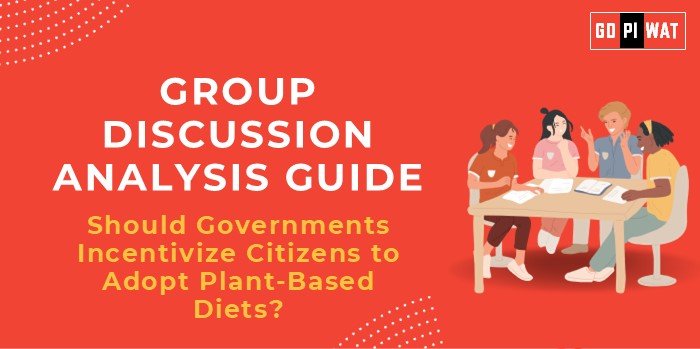📋 Group Discussion Analysis Guide
🥗 Should Governments Incentivize Citizens to Adopt Plant-Based Diets?
🌟 Introduction
Context: As concerns about climate change, public health, and food security escalate, plant-based diets are gaining global attention. Transitioning to such diets could mitigate greenhouse gas emissions, address resource inefficiencies, and promote healthier populations.
Background: The plant-based diet movement roots in sustainability, driven by reports like the EAT-Lancet Commission’s findings on sustainable food systems and the Paris Agreement’s climate targets. Several nations, including Denmark and Germany, are exploring subsidies or policy incentives for plant-based alternatives.
📊 Quick Facts and Key Statistics
- 🌍 GHG Emissions from Livestock: Contribute approximately 14.5% of global emissions, according to the FAO.
- 💧 Water Usage: Producing 1 kg of beef requires 15,400 liters of water compared to 322 liters for 1 kg of vegetables (Water Footprint Network).
- 💰 Economic Impact: The global plant-based market is projected to reach $77.8 billion by 2025 (Allied Market Research).
- ❤️ Health: Plant-based diets are associated with a 22% lower risk of heart disease (JAMA).
👥 Stakeholders and Their Roles
- Government: Frame subsidies, tax incentives, or educational campaigns to promote plant-based eating.
- Agriculture Sector: Transition farming practices towards plant-based products, reducing dependency on livestock.
- Private Companies: Innovate and scale plant-based food technologies.
- Citizens: Adopt lifestyle changes aligned with sustainability goals.
- International Organizations: WHO and UN can set global benchmarks for sustainable food systems.
🏆 Achievements and Challenges
🌟 Achievements:
- 🇩🇰 Denmark’s Policy Models: Financial incentives for plant-based food development.
- 🌱 Meat Reduction Campaigns: “Meatless Mondays” in various countries gained traction.
- 🏢 Corporate Adoption: Companies like Beyond Meat and Impossible Foods driving market innovation.
⚠️ Challenges:
- 🍽️ Cultural Barriers: Food traditions and preferences resist rapid change.
- 💸 Economic Disparity: Higher costs of plant-based foods deter widespread adoption.
- 🏭 Policy Implementation: Resistance from agricultural lobbies.
Global Comparisons:
- 🇩🇪 Germany: Tax incentives for meat substitutes show promise.
- 🇧🇷 Brazil: Struggles with balancing cattle farming and sustainability goals.
📑 Structured Arguments for Discussion
- Supporting Stance:
“Incentivizing plant-based diets can lower healthcare costs, reduce emissions, and promote food security.”
- Opposing Stance:
“Transitioning to plant-based diets could economically hurt traditional farming communities and increase reliance on processed alternatives.”
- Balanced Perspective:
“While promoting plant-based diets is beneficial, policies must address affordability, cultural inclusivity, and economic displacement.”
✨ Effective Discussion Approaches
- Opening Approaches:
- 📊 Statistical Start: “Animal agriculture contributes to 14.5% of global emissions—shifting to plant-based diets could drastically cut this number.”
- ❓ Ethical Query: “Should governments regulate personal diet choices for environmental reasons?”
- Counter-Argument Handling:
- Counter cost concerns by citing declining prices of plant-based alternatives due to technological innovations.
🔍 SWOT Analysis
- 💪 Strengths: Environmental benefits, reduced healthcare costs.
- ⚠️ Weaknesses: Higher initial costs, limited accessibility.
- 📈 Opportunities: Innovation in food tech, alignment with sustainability goals.
- 🌋 Threats: Political opposition, reliance on imports.
🏫 Connecting with B-School Applications
- Real-World Applications:
- 🔄 Exploring this topic links to MBA themes in sustainability management, agribusiness, and public policy.
- Sample Interview Questions:
- “How would incentivizing plant-based diets impact global food security?”
- “What role can marketing play in changing food consumption patterns?”
- Insights for Students:
- 📊 Focus on policy implications for green business strategies.
- 🌱 Explore opportunities in plant-based food entrepreneurship.


